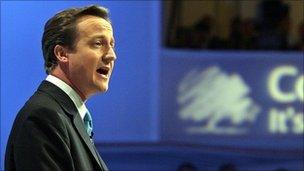Pro-AV Tory accuses party of 'stifling debate'
- Published

David Cameron has said he will campaign against changing the voting system
A Conservative activist has accused his party of stifling debate about the case for change to the UK electoral system.
John Strafford said supporters of a switch to Alternative Vote were told they could not hold a meeting at the party's Spring conference in Cardiff.
This contradicted David Cameron's call for an "open debate", he said.
The Conservative Party, whose leaders back the existing first-past-the post system, said they had not received any application from Mr Strafford.
The government plans to hold a referendum on whether to retain first-past-the-post or switch to AV on 5 May, providing the legislation needed to authorise the poll in time is approved by Parliament by 16 February.
The vast majority of Tory MPs support retaining first-past-the-post, arguing that it has historically resulted in stable government and maintains a direct constituency link between the public and MPs.
'Debate needed'
It is understood the cross-party Yes to Fairer Votes campaign, which supports a switch to Alternative Vote, sought to stage an event at the Tory spring conference but were turned down.
Mr Strafford, who said his Conservative Yes to AV movement came under the umbrella of the official Yes campaign, argued he and other activists were being denied the chance to debate the merits of the two systems.
He told the BBC that party officials had not given any explanation for the decision and he would canvass delegates about the issue at the conference.
"David Cameron has said Conservatives have a free vote on the issue so why can't we have a debate," he said.
The activist, who runs the organisation Campaign for Conservative Democracy, said a growing number of elected officials and party members - including councillors and peers - supported a switch to AV although he would not disclose who they where.
"Quite a lot of prominent Conservatives do not want to come out and say they are pro-Alternative Vote because they know they will get a lot of flak from the grass roots," he said.
The AV system offered the party an opportunity to re-connect with younger voters and broaden its electoral appeal, he said.
The electoral landscape had changed dramatically in the past thirty years, he added, with smaller parties garnering more votes and fewer Tory and Labour candidates being elected with the backing of more than 50% of voters in their constituency.
Critics say is a fundamental weakness of the current system which a switch to AV will help to mitigate.
Mr Strafford, who first made his claim in an article for the ConservativeHome website, external, said the Tories had to adapt to the new environment or risk "becoming a rump party in the south of England".
But a Conservative Party spokeswoman said she was "confused" by Mr Strafford's comments as the party had not received any request from him to stage a meeting in Cardiff.
Wedding row
A number of senior Conservatives, including Ken Clarke and party chairman Baroness Warsi, have pledged their support for the cross-party No to AV campaign - as have a number of former Labour ministers and MPs from both parties - while David Cameron has said he will campaign against any change.
The Yes to Fairer Votes campaign has also attracted support from across the political spectrum while both the Lib Dems and Labour have launched their own pro-change movements.
The rival cross-party campaigns have been involved in a row over the potential impact that the wedding of Prince William and Kate Middleton - which will be held six days before the poll - may have on the final days of the referendum campaign.
The No campaign has accused its rival of "politicising" the wedding - a claim rejected by the Yes campaign - after a source for the Yes campaign told the Guardian newspaper, external that the event could usher in a "coming-into-summer, more optimistic, more of a yes mood".
Under first-past-the-post, voters are allowed to vote for one candidate and the individual obtaining the most votes is elected.
Under the AV system, voters rank candidates in their constituency in order of preference.
Anyone getting more than 50% of first-preference votes is elected and if no-one gets 50% of votes, the candidate with the fewest votes is eliminated and their backers' second choices allocated to those remaining.
This process continues until one candidate has at least 50% of all votes in that round.
- Published18 April 2011
- Published10 February 2011